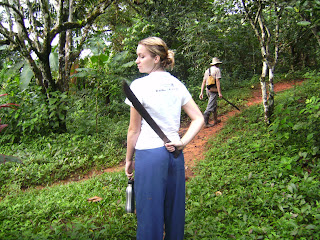As my mind overflows with thoughts in both Spanish and English, with translations and conjugations, with rice and with beans, I find it hard to concentrate on just one concept, to pinpoint one main thing that I’ve learned over the past week. But I think that’s the point of immersion… I dove into a culture where the water, like that of a bucket bath, was both freezing and refreshing. I explored the sandy bottom, its problems, it quirks, and its beauty, and kicked my way to the top where a few deep gasps for air, allowed me to exit the cold water with a better notion of this place, this environment, and these people. But the unpleasant yet necessary side affect of immersion in a developing country is that once you reach the surface again, your perceptions of the developed world are murkier than ever.
Nicaragua is a curious case, and it seems on a whole to be relatively under appreciated. Its slutty tico neighbors (Costa Rica) are in the process of selling their bodies to foreign investors, exchanging untouched beaches for US dollars, and allowing tourists to overrun culture with surfboards and “eco-lodges”. But Nicaragua remains relatively untouched. They have the capacity to reap benefits from tourism but seem to still be regaining their balance from a bloody ten year revolution which crippled their way of life and was followed by natural disasters which left cities in ruin and pueblos underwater. Maybe it is the resilience of the people here that strikes me so. But after two weeks, I still find it difficult to pinpoint, what exactly about this place moves me so and makes me sure that I want to return.
Perhaps it is this host-family of mine. They are a curious mix of characters, but all in all a true representation of the people of Nicaragua: warm, blunt, hilarious and incredibly strong. The majority of the family wakes at 4 am to take a microbus to Zona Finca, the sweat shop to the north. The others arise equally early to sell fruit in the next town. They come home after 13 hour days exhausted to the bone but still so eager to talk to Aeriel and I, to learn more about the states, and to help us with our Spanish homework.
Do they know they’re tired? Claro que si.
Do they know they’re poor? Pienso que no.
They know that they don’t have as much as people in the states, but they also never complain. They have everything they need and they work in sweatshops because their options are so limited. They work to send their kids to school and hope that their children will have more opportunities.
I sit across from my host Aunt at dinner and she describes her work… sitting in Zona Finca in an assembly line system where her role is to sew the seams into tank tops to export to the states. She points to my shirt and pulls at the seam…
“Yo hago camisetas como eso”..( I make shirts like this).
This is not the only moment I grow immediately embarrassed of where I come from. It will happen almost every day with almost every conversation I have here in San Juan. Their intent is not to make me feel this way…but how can it be avoided? My host grandmother never learned to read because things like education were put on hold during the Nicarguan revolution. I come from the country who’s president fully funded the Contra army, the country who gave millions of dollars to a group of rebel soldiers who would then brutally massacre, slaughter and rape Nicaragua’s most innocent civilians. The more I learn, the more I am utterly disgusted.
The next morning, my conversation teacher Elisa, who has over the week shared her life with me taking me to her daughter’s graduation and welcoming me into her home on various occasions, asks me, “Hay epidimicas in Los Estados por chemicas?” (Are there epidemics in the states caused by chemicals?)
As I take more than 5 seconds to respond, searching for an answer that is both accurate and translatable, she pulls out a book that she found while studying. It is the Dole catastrophe of the early 90’s where a pesticide called Nemagon, was implemented without proper testing on the Banana farms of central Nicaragua. The results are horrifying and still being felt by thousands of Nicaraguans as the pesticides not only resulted in horrendous genital cancers and skin abrasions for the workers but quickly seeped into the next generation as the children of the workers were born with birth defects that prevented normal bone growth.
Today, Dole, the world’s largest fruit and vegetable producer is currently valued at $6.9 billion and has not yet fully compensated Nicaragua for this atrocity.
Aeriel and I talk at length about this issue since we both struggle with it. We know it’s wrong, we know we’re lucky and we’re not the ones who determined where we’d be born or what opportunities would be laid at our feet, but I can’t shake it. I’m ashamed of where I come from and all that I have.
There is no solution or end to this latest thought, like Nicaragua it’s a hard thing to pinpoint. I have no doubt that it is not the last time in my travels that I will feel this way, but am confident that the best thing to do is continue learning by immersion and attempting to appreciate the intricacies of each new culture. Traveling is more than beaches and language, it’s necessary to drown in a culture and its problems every so often to gain perspective.
Onto Honduras…here’s to diving in and kicking my way to the surface.










